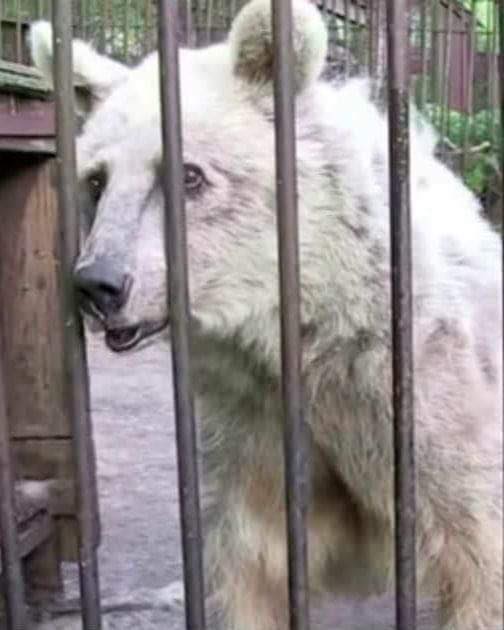For three decades, a bear named Fifi endured a life of hardship in a cage, trapped in a Pennsylvania zoo, forced to perform tricks like a circus animal. Her early years were marked by exploitation, and as time passed, her condition deteriorated. Eventually, arthritis left her nearly unrecognizable.
After years of suffering, her luck changed when People for the Ethical Treatment of Animals (PETA) intervened. The organization rescued Fifi and brought her to the Wild Animal Sanctuary in Colorado, where she finally received the care she deserved. The sanctuary provided her with proper medical treatment, addressing her untreated arthritis and offering her a chance to live freely, as all animals should.
This story highlights the darker side of zoos and the exploitation of animals for entertainment. Fifi’s case is one among many, reminding us of the broader ethical issues surrounding animal captivity. Zoos often justify captivity by claiming they contribute to conservation, but many animals suffer physical and mental ailments due to unnatural confinement. Fifi’s condition—arthritis left untreated for years—is a common consequence of poor care in captivity.
Her rescue, however, symbolizes hope for many animals in similar situations. Upon arriving at the Wild Animal Sanctuary, Fifi underwent a transformation. The once frail bear slowly regained her strength, and her rehabilitation became a testament to the power of proper care and compassion. Videos of her first moments of freedom, stepping into the open environment after decades in a cage, have touched the hearts of many. Her joy is evident, as she explores her new surroundings, free from the chains of her former life.
The broader issue of animal captivity raises questions about whether zoos should continue to exist in their current form. While some zoos genuinely aim to protect endangered species, others, like the one where Fifi lived, prioritize profit over animal welfare. The confinement of wild animals for human entertainment is increasingly seen as unethical by animal rights activists. Fifi’s story is a powerful reminder that animals deserve freedom, respect, and proper care.
Fifi’s new life is a far cry from the horrors she endured. She now roams freely in a vast, open sanctuary, surrounded by other rescued animals, and receiving the medical treatment she needs. Her story has inspired countless people to rethink the ethics of keeping animals in captivity, and her joyful response to freedom continues to resonate with viewers worldwide.
The campaign for the ethical treatment of animals is growing, and Fifi’s rescue is a clear example of how far we have come—and how far we still need to go. This journey from despair to freedom is an ongoing reminder that no animal deserves to be caged, and organizations like PETA are vital in ensuring more animals like Fifi get the second chance they deserve.
In conclusion, Fifi’s transformation is an uplifting story of resilience and redemption. After three long decades of suffering, she is now living the life she was always meant to live. While her story has a happy ending, it also serves as a sobering reminder of the plight faced by many animals still confined to cages. Let Fifi’s journey inspire us to continue fighting for the rights of all animals, ensuring they too can experience the joy of freedom.

